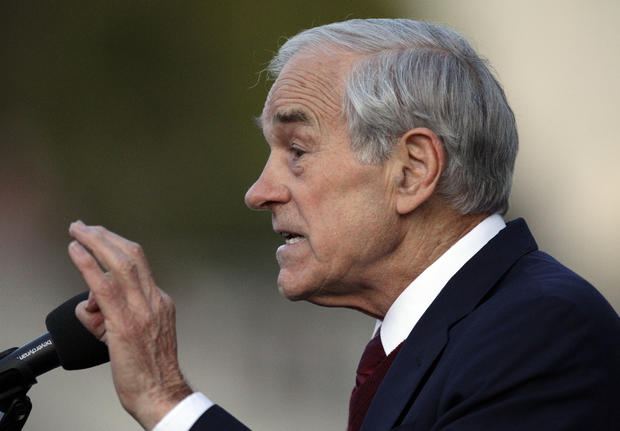Ron Paul plays the long game
NEWS ANALYSIS
(CBS News) On a conference call with reporters on Tuesday, Ron Paul's campaign chairman Jesse Benton stressed that the campaign wants the Texas lawmaker's supporters who travel to Tampa in August for the Republican National Convention to be "respectful."
"We just can't emphasize that enough," said Benton, adding that the campaign wants to "make sure that decorum and respect are the name of the game, but we're going to respectfully show that our people are here, and we're the wave of the future."
The Paul campaign's desire to convince its loyal supporters to play nice in Tampa is grounded in the simple fact that his movement needs the Republican party. Paul, who has stopped active campaigning, has significant differences with his party. But he understands that it's very difficult to gain traction outside the two-party system. So he's trying to work within the system by moving the Republican Party in his direction.
The problem is that supporters of the 76-year-old politician aren't shy about showing their disdain for the Republican party or its current standard bearer, Mitt Romney. The Paul strategy for making a splash at the convention centers on building up delegates by exploiting the byzantine delegate selection process; Paul supporters have been successful in states like Nevada in packing the state delegation with supporters even though Romney won the state.
But they haven't always been civil about it: Romney's son Josh was booed by Paul supporters in Arizona, and Paul backers have created disturbances in Oklahoma, Maine and other states that have angered other participants in the selection process. That behavior has complicated Paul's efforts to leverage his support to extract concessions from Romney.
Benton noted that Paul supporters "are going to be under the microscope" in Tampa, and the campaign wants them to be remembered for helping push Paul's message into the GOP mainstream, not for causing headaches for the nominee by generating headlines about dissent in the ranks. This desire to make peace with the party is also why you shouldn't expect Paul to endorse a third-party candidate like Libertarian nominee Gary Johnson, who holds views closer to Paul than Romney does.
The Paul campaign is seeking to get its positions on "monetary policy reform, prohibitions on indefinite detention, and Internet freedom" into the GOP platform, according to a strategy memo released publicly, and has been in talks with the Romney campaign in an effort to do so. The Romney camp doesn't need to play ball - the candidate will have the nomination secured before anyone gets to Tampa - but it has reason to make concessions if it means helping to keep the Paul delegates from causing too much trouble.
Perhaps the most important impact the Paul delegates can have at the convention is in their votes on party rules. Many of the Paul supporters who travel to Tampa will be bound to vote for Romney on the first ballot, but they can cast whatever vote they want on the rules for electing Republicans in the future. Benton declined to get into specifics on the conference call on the rule changes the campaign is seeking, and follow up requests for clarification to multiple members of the campaign went unanswered. But Benton said broadly that the goal was to "open up the party" and keep establishment candidates from "locking the party down."
One person who has already successfully taken on the GOP establishment is Ron Paul's son, Kentucky Sen. Rand Paul, who defeated the establishment pick in the GOP primary in 2010. Though Benton said Tuesday that it's too early to speculate on a Rand Paul presidential run, his campaign has made clear that it is paving the way for Rand Paul to seek the presidency in 2016 or 2020.
In 2008, Paul was so estranged from his party that he held a rival nominating convention in Minneapolis-St. Paul while the GOP was selecting John McCain as party nominee. This time around, he and his supporters are poised to (grudgingly) rally around their party's nominee in an effort to position their movement for greater successes in the future. It's a pragmatic strategy perhaps best understood with a variation on a familiar phrase: "If you can't beat them, join them. And then change them."
